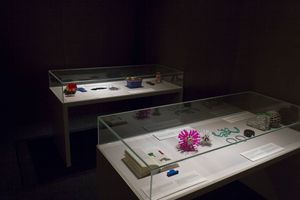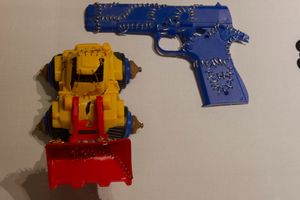The Ministry of Plastic (touring exhibition)
2017
The Ministry of Plastic_Installation Image_2017_(c)Hopkins-1
The Rubbish Companion - Introduction By Omer J. Groves Of The Plastic Harvesters Union
original publicationIt is an honour, a pleasure and a joy to be called upon to write the introduction to The Rubbish Companion. Yet, I must admit to a certain degree of trepidation as I write these lines. Because what can someone like me say about such a momentous text? Is there anything that I can possibly add to this story? At risk of being both presumptuous and redundant, I will at least try.
The Book, as most of us now call The Rubbish Companion, is a simple work that had complex consequences. Single-handedly, it changed our worldview, triggered a Copernican shift in consciousness and finally made us see the wealth in front of us. We all know this story now, it is as familiar to us as the air that we breathe. But the familiar can be deceptive and perhaps today we are too familiar with this story. Do we really know why The Book changed our world view? Can we clearly answer the question of how, what is essentially a guidebook to plastic, effected global change?
Like all of us, I grew up reading The Book, studying the drawings, learning the poetic explanations of each object, what it was used for, how it felt. And like most of us, I also grew up in a world that valued plastic, that understood that these plastic objects that we have in our hand are part of a chain of resources. If we do not recycle this bottle as a bottle, we break this chain, we remove a tiny piece from the system which means it is less efficient. We do not close the loop. We learn this as children, we sing nursery rhymes about it, closing the loop is in our very essence.
But the author of this book did not live in our world. He lived in a world in which there was still plentiful crude oil. He lived in a world where plastic was seen as infinite. Disposable was synonymous with convenience and plastic was seen as rubbish! In those days cities and governments would take plastic and bury it in huge 'landfills' to get rid of it. This idea is beyond inconceivable to us today; how they thought burying plastic would make it disappear, I will never ever know. Still, I suppose we should be grateful, for was it not for their short-sightedness then, we would not have these deposits of plastic to mine today.

The Ministry of Plastic_Installation Image_2017_(c)Hopkins-1
So what I am trying to say is that the author of The Book managed to overcome the prejudices of his environment and see the world with different eyes. He saw worth in what was then worthless. Again, it is almost impossible for us to imagine this today, but in those times plastic objects were untagged and there were open public bins. There was plastic lying on the street and even the oceans were full of plastic. If he saw our smart systems today of trackable plastic, secure bins and the beautiful network of air-locked channels and chambers to transport plastic back to our printers, I do not know what he would think.
Turning through these pages, I have the sensation that I am walking through the chambers of a brilliant mind, a mind that is slowly assembling a vast jigsaw puzzle. Because by starting to define these objects, to build a corpus of plastic, to describe use, feel, appearance and category he stopped seeing stars and started to see a constellation. What is most sacred about The Book, is not the fifty objects that he describes but the fact that he had the consciousness to describe them. His magic is the magic of perception; the author of The Book started a process of seeing, which we are still continuing today.
About him personally, we know very little, in fact only what he tells us in the brief introduction, which could of course be fiction. He tells us he is a man and that he makes his living from collecting plastic on the streets. His sparse prose, rudimentary language and basic drawing abilities point to the fact that he was an autodidact. For me, it is precisely this economy of language and line that constitutes the lean, sleek poetry of this work. He mentions more than once that he is alone, lonely and feels misjudged by his fellow man. It makes me both angry and sad, that someone who saved future generations had to suffer so in his lifetime.
So, as we return to these pages again and again let us honour and remember the invisible hero that wrote this book. Let us strive to continue his work. Let us consume our plastic consciously. Let our young continue to go and harvest plastic. Plastic is sacred. Close the loop.

The Ministry of Plastic_01_Installation Image_2017_(c)Hopkins-16
download text as PDF